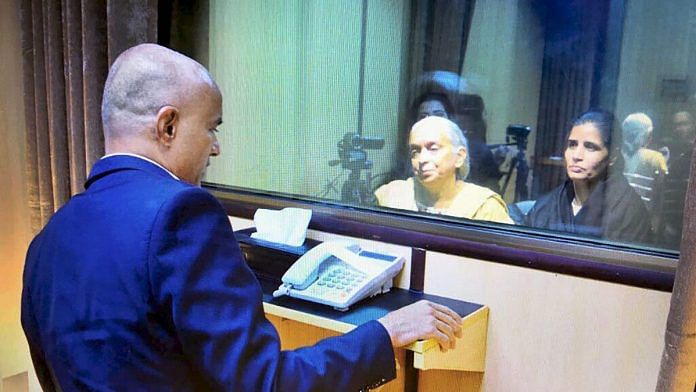New Delhi: Pakistan has tried every trick, bordering on the offensive and highly questionable, to build a case against India in the Kulbhushan Jadhav hearing before the International Court of Justice (ICJ).
During the four-day hearing at The Hague, Pakistan raised questions over the fact that the ad hoc judge from its side was not present, issued a ‘veiled threat’ to India’s lead counsel, used intemperate language, and even harped on a typographical error in a paragraph of India’s submission.
India, meanwhile, cited Pakistan’s continued support to terrorists operating in Indian territory as well as recent terror incidents — including the 14 February Pulwama attack — to buttress its case.
Court proceedings and submissions by Harish Salve and Khawar Qureshi, lawyers representing the two countries, accessed by ThePrint, show Pakistan has been trying to strong-arm the ICJ into delaying the proceedings or not accepting India’s arguments.
However, so far, its efforts have not found any acceptance.
‘Veiled threat’
In his counter to the arguments made by the Pakistani side Wednesday, India’s lead counsel Salve brought to the ICJ’s notice a letter written to him by Pakistan, one where he referred to a ‘veiled threat for my role in certain submissions’.
“Since Mr (Khawar) Qureshi brought it up, I must mention that I have received a letter from him containing a veiled threat for my role in certain submissions made and extracts of certain reports found in India’s Memorial and Reply,” Salve told the ICJ.
‘Invectives and insults’
Referring to the language used by Pakistan, Salve pointed to the transcript of the statement made by Pakistan’s lawyer.
“The transcript is peppered with words such as ‘shameless’, ‘nonsensical’, ‘laughable’, and ‘breathtaking arrogance’. On a quick count, ‘shameless’ and ‘nonsense’ occur five times each, ‘arrogance’ four times, ‘ridiculous’ four times and ‘disgraceful’ four times. And these are addressed to the submissions made in the Memorial and the Reply by the sovereign Republic of India. India takes exception to being addressed in this fashion in an international court. Beyond saying this, I would let the matter rest for I do not, and the Indian culture prevents me from so doing, indulge in language of invectives and insults,” Salve told the court.
Salve then went on to add, “It is with a degree of regret that I submit that the tone and tenor of submissions made yesterday do not befit the dignity and solemnity of the proceedings in this Court, are incompatible with the degree of respect that needs to be shown to sovereign republics in relation to matters such as their filings and submissions.”
Lahore High Court Bar Association’s criticism
Pakistan’s lead counsel Khawar Qureshi on Wednesday explained the Lahore High Court Bar Association’s criticism of the fact that the ICJ had ordered provisional measures — securing Pakistan’s assurance that Jadhav would not be executed before the international court decided the case.
In a sharp response, Salve said that the views of the Bar should be read as those of the Pakistan government and vice versa.
“The kind of sentiments that have been expressed about the stature of the Association are a surprise, at least to me as an Indian lawyer. The Lahore High Court is one of our original Letters Patent Courts; we cite their authorities, it has a history and a tradition that is respected in the subcontinent. Speaking of its Bar Association with such derision is a matter on which I would not comment any further, beyond saying that perhaps Mr Qureshi may never be invited to tea by that Association again,” he said.
Also read: As ICJ hears Kulbhushan Jadhav case, a look at what the international court is all about
Missing ad hoc judge
On Monday, the Pakistan side had said that since ad hoc judge Tassaduq Hussain Jillani was temporarily indisposed, it should be allowed to exercise its right to appoint his replacement.
Just before Wednesday’s hearing closed, ICJ President Abdulqawi Ahmed Yusuf responded to the issue. He said Jillani was receiving transcripts of the oral proceedings and ‘may also watch them via webcast either as they are held or at a later date’ and that he ‘has been participating in the case and may continue to do so’.
Also read: India wants ICJ to declare Kulbhushan Jadhav’s trial in Pakistan ‘unlawful’



